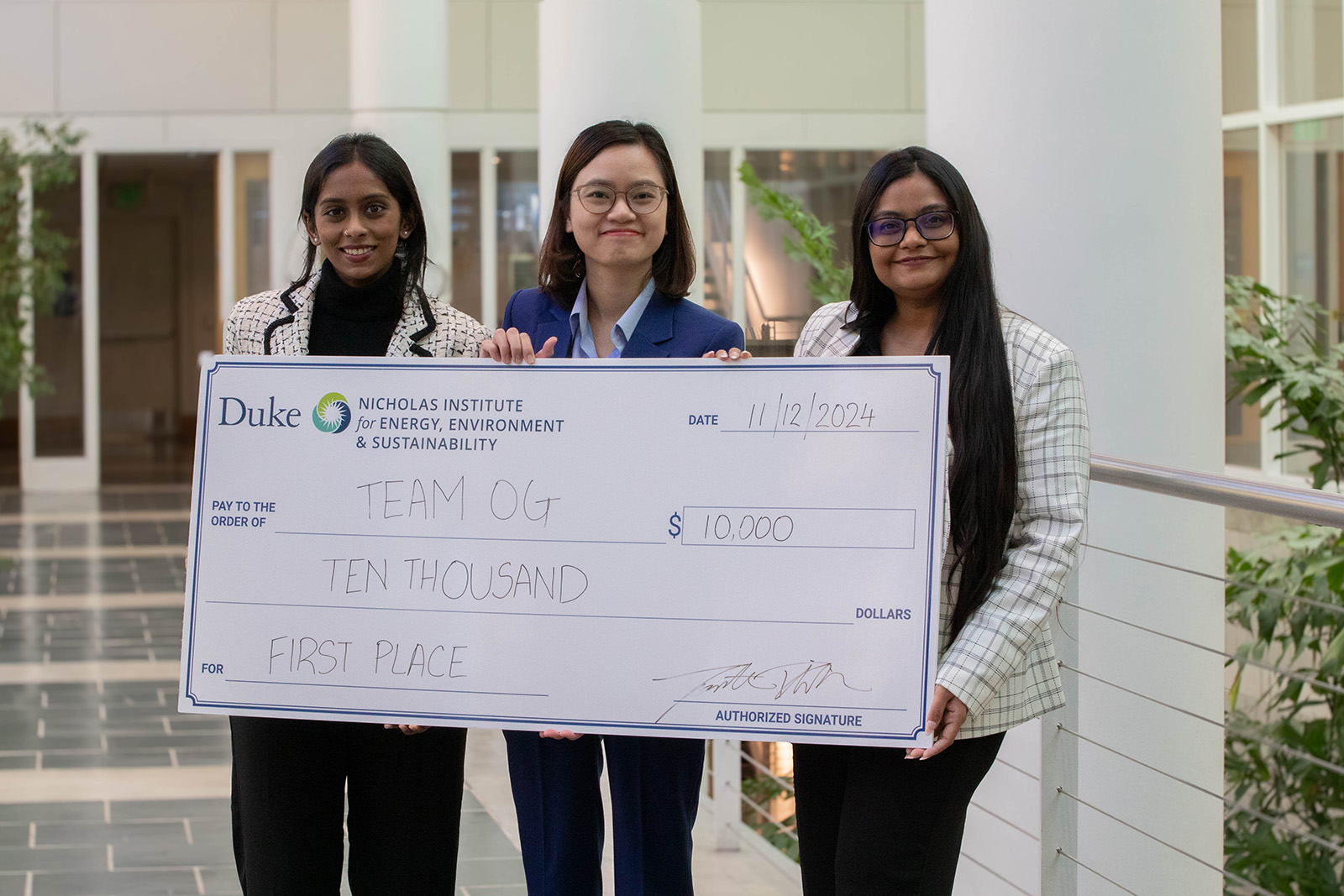Graduate Student Teams from Around the World Compete to Address Energy Business Challenges in Emerging Markets
Teams from Syracuse, Duke and McGill universities were collectively awarded $15,000 for developing energy business models for Ugandan e-mobility company Zembo.

Three graduate students from Syracuse University earned first place in the finals of the 2024 Energy in Emerging Markets Case Competition held Tuesday at Duke University.
Now in its 12th year, the competition engages diverse, creative teams of graduate students to address real energy challenges affecting the developing world. Students are encouraged to propose unconventional, business-based solutions for an industry partner, exposing unrecognized opportunities with positive social and environmental impact.
The competition awards $15,000 in prizes annually as part of Energy Week at Duke. It is organized by the MBA Energy Club at Duke's Fuqua School of Business and is sponsored by the James E. Rogers Energy Access Project at Duke.
The top teams were:
First Place – Syracuse University ($10,000)
- Aakanksha Maheshwari
- Trang Nguyen
- Vaijayanthi Kadhiravan
Second Place – Duke University ($4,000)
- Ren Renfro
- Veena Shirsath
- Ed Maclean
- Sneha Thirkannad
Third Place – McGill University ($1,000)
- Felix Veaux
- Yi Juan (Yina) Liang Li
- Xuanlong (Lincoln) Lyu
- Arturo Medina
The two other finalist teams represented the Alliance Manchester Business School (University of Manchester) and York University.
"Through this competition, I discovered my passion for research and exploring diverse fields,” said Aakanksha Maheshwari, a member of the winning Syracuse team. “It also taught me the importance of selecting a good team and the value of teamwork. To achieve success in the competition, I can't thank Syracuse University enough for their guidance and support. Thank you to the Duke team for organizing this wonderful event and challenging our critical thinking abilities."
Members of the Duke team welcomed the opportunity to apply concepts they have been learning in the classroom to the unique context of a startup in an emerging market.
"Competitions like this are invaluable because they pull back the curtain on the messy, complex challenges companies face in real time—far from the ideal scenarios or retrospectives we often study in class," said competitor Ren Renfro (MBA ’26). “This experience has pushed me to think more critically and creatively, sharpening my skills as an analyst and, hopefully, as a future leader.”
Over the fall, the competition engaged 71 teams of graduate students from 35 universities spanning 11 countries: the United States, Canada, the United Kingdom, France, Morocco, India, Pakistan, China, Germany, the Netherlands and Spain.
Zembo, this year’s industry partner, is a pioneering e-mobility company in Uganda that aims to build the nation’s largest battery-swapping network for electric motorcycles. The case tasked teams with developing business models for scaling Zembo's charging infrastructure while tackling grid reliability challenges in Uganda.
Judges for the final round represented Zembo, the Energy Access Project, The AES Corporation, CrossBoundary, RTI International, and Duke’s Nicholas Institute for Energy, Environment & Sustainability. In-person attendees had the opportunity to meet the judges during a networking lunch to hear about their own work and professional trajectories and get career advice.
“Year after year, I'm consistently impressed with the rigor and creativity students display in pitching business solutions to real-world energy challenges through this competition,” said Jonathan Phillips, director of the Energy Access Project. “For many of the participants, this experience will serve as a gateway into thinking more deeply about energy access issues in emerging economies and pursuing careers to solve them.”
Started in 2013, the competition was the vision of the late Jim Rogers, former CEO of Duke Energy and later a Rubenstein Fellow at Duke University. Rogers worked with the university to build partnerships and identify opportunities to bring modern energy to developing countries. That work continues at Duke through the Energy Access Project, which Rogers and his wife, M.A., established with a gift in 2017 and today bears his name.
The lead Duke graduate students who developed the case and organized the 2024 Energy in Emerging Markets Case Competition were Nadia Khmou (MBA '25), Vanshika Mittal (MEM '25) and Brian Mulu (MEM '25).
Questions? Contact casecompetition@duke.edu or energyaccess@duke.edu.

